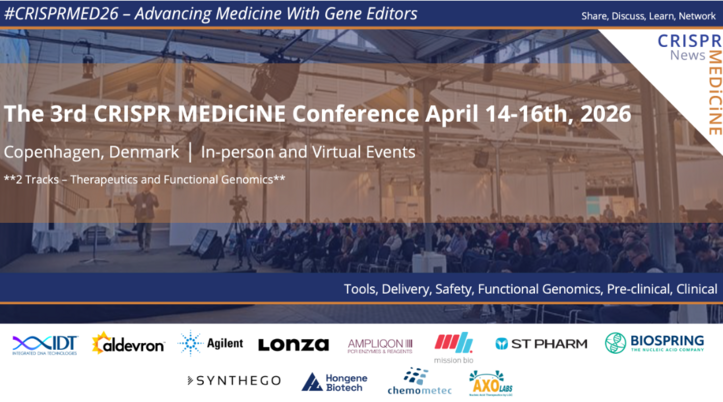CMN Weekly (17 June 2022) - Your Weekly CRISPR Medicine News
By: Karen O'Hanlon Cohrt - Jun. 17, 2022
Top picks
- Children to get CRISPR treatment for sickle cell disease in trial. This write-up in New Scientist discusses the recent inclusion of children in a clinical trial of exa-cel (formerly known as CTX001), which is jointly-developed by CRISPR Therapeutics and Vertex Pharmaceuticals for the treatment of sickle cell disease and beta thalassemia.
- Gene Genies: Inside The Revolutionary Biotech That Can Edit DNA Inside Living Humans. This write-up in Forbes about Intellia Therapeutics gives an overview of the company's major achievements, which include the first demonstration of in vivo editing in humans, as well as what financial and legal hurdles the company must overcome before it can get a new treatment on the market. You can learn more Intellia Therapeutics by checking out our coverage to date here.
- Looking for a job in gene editing? Then look no further than the CMN Jobs platform, with many open international positions within gene editing, CRISPR medicine, gene- and cell therapy. See all current listings here.
Research
- A team of scientists from Tel Aviv University in Israel shared its findings in a recent article in Nature Biotechnology, describing a potentially new treatment approach for HIV and AIDs. The approach involves CRISPR-editing patient B cells so that they can secrete neutralising antibodies against HIV to eradicate the virus from the body. The team performed in vivo B cell editing using two adeno-associated viral vectors, with one coding for Staphylococcus aureus Cas9 (saCas9) and the other for 3BNC117, an anti-HIV bNAb. After injecting the vectors into the bloodstream of mice, the team observed successful editing of B cells leading to memory retention and bNAb secretion at neutralising titers. Minimal off-target editing was observed, and the authors suggest that an in vivo B cell editing approach may also be useful for the treatment of non-infectious conditions such as cancer and autoimmune diseases.
- Scientists in the U.S. and Brazil have used CRISPR to make a breakthrough discovery about the origins of blood. Specifically, the team used an in situ barcoding approach that allowed them to map the fate and assess the developmental and clonal origins of adult blood cells in mice. The barcoding step was performed using either CRISPR or a transposase to inserted unique genetic sequences into embryonic mouse cells that would be passed down to any descendent cells, and the new findings uncover an early wave of progenitor specification—independent of traditional haematopoietic stem cells — that begins soon after endothelial-to-haematopoietic transition. The findings were published yesterday in Nature.
- In an article published yesterday in Frontiers in Genome Editing, scientists in the U.S. describe how activation of the protamine 1-encoding gene PRM1 using an epigenome editing approach based on catalytically-dead Cas9 (dCas9) decreases the proliferation of tumorigenic cells. PRM1 is exclusively expressed in sperm and is known to play a vital role in the tight packaging of DNA, thus inducing transcriptional silencing in sperm cells. The team hypothesised that activation of PRM1 in tumorigenic cells would lead to DNA condensation and reduce the proliferation of these cells.
Clinical
- Caribou Biosciences has reported positive additional data from the ongoing Phase 1 ANTLER trial of CB-010 in relapsed or refractory B cell non-Hodgkin lymphoma (r/r B-NHL). CB-010 is an off-the-shelf allogeneic CAR-T cell therapy canddiate that is genome-edited using the company's next-generation CRISPR-Cas technology that is based on CRISPR hybrid RNA-DNA (chRDNAs). The data was presented at the European Hematology Association (EHA) 2022 Hybrid Congress. Read about previous clinical data for CB-010 in our recent clinical trial update here. See also this write-up in Nature about Caribou's first clinical candidate.
- CRISPR Therapeutics presented positive results from its Phase 1 COBALT™-LYM Trial of CTX130™ in relapsed or refractory T-cell malignancies at the 2022 European Hematology Association (EHA) Congress earlier this week. In the presentation, the company revealed a 70% overall response rate (ORR) and 30% complete response (CR) rate in peripheral T-cell lymphoma (PTCL) and cutaneous T cell lymphoma (CTCL) at Dose Level 3 (DL3) and above, translating to a clinical benefit for 90% of patients tested. In addition, the company reported a well tolerated safety profile across all dose levels with no dose-limiting toxicities observed.
- Vertex Pharmaceuticals and CRISPR Therapeutics presented new clinical data on more patients with longer follow-up after treatment with exagamglogene autotemcel (exa-cel, formerly known as CTX001) at the 2022 European Hematology Association (EHA) Congress. The new data supports the potential use of exa-cel as a one-time functional cure for transfusion-dependent beta thalassemia and severe sickle cell disease, with a safety profile that is generally consistent with myeloablative conditioning and autologous stem cell transplantation.
Industry
- OliX Pharmaceuticals' subsidiary mCureX announces mRNA technology collaboration with ToolGen for the treatment of rare eye diseases. OliX is a leading developer of RNAi therapies, and its subsidiary mCureX specialises in mRNA vaccines and therapeutics. Under the new collaboration, ToolGen, with expertise in therapeutic gene-editing technologies, will conduct gene corrections in ocular (eye) tissues using mCureX's mRNA technology and ToolGen's CRISPR-Cas9 gene-editing technology, for the treatment of rare and incurable hereditary eye diseases.
- ERS Genomics Limited reported earlier this week that India Patent No. 397884 was granted on May 27th, 2022. This patent covers methods and compositions for use of CRISPR-Cas9 and chimeric Cas9 in all cell types including eukaryotic cells.
- Affini-T Therapeutics & Metagenomi have announced a next-generation gene-editing partnership to advance cell therapies for the treatment of solid tumours. The partnership will leverage the potential of Affini-T’s next-generation ex vivo T-cell receptor (TCR) cell therapies for solid tumour patients using Metagenomi’s novel proprietary gene-editing systems.
Detection
- Scientists in China have developed a rapid, ultra-sensitive, and one-pot DNA detection method combining recombinase polymerase amplification (RPA) and CRISPR-Cas12a for African swine fever virus (ASFV) and Capripoxvirus (CaPV), both of which cause massive economic losses within the livestock industry. The new platform, named one-pot-RPA-Cas12a (OpRCas), showed 93.3% consistency with qPCR for clinical sample analysis, and additional benefits include ease of handling, high sensitivity, and rapid turnaround time to results. The findings were published yesterday in Applied Genetics and Molecular Biotechnology.
Reviews
- Challenges and opportunities when transitioning from in vivo gene replacement to in vivo CRISPR/Cas9 therapies - a spotlight on hemophilia. This expert review outlines the challenges and opportunities in treating haemophilia, including the progression from in vivo gene therapies towards in vivo gene editing, focusing on pre-clinical and emerging clinical data for gene editing and addressing the need for sustained and durable gene expression during hepatocyte proliferation when the liver is unable to maintain steady gene expression and protein production.
- CRISPR-Cas9-Based Technology and Its Relevance to Gene Editing in Parkinson’s Disease. This review presents a detailed overview of novel gene-editing delivery vehicles with applications in research and prospective therapeutics for Parkinson’s disease (PD) and other chronic and debilitating neurodegenerative diseases. The authors review the most recent advances in CRISPR-based applications and gene therapies for PD, and explore the benefits and drawbacks of using them for a range of gene-editing applications in the brain, emphasising some fascinating possibilities.
- Exploring the genetic space of the DNA damage response for cancer therapy through CRISPR-based screens. This review by authors in Austria discusses synthetic lethal and viable interactions within the DNA damage response and present how CRISPR-based genetic screens and chemical compounds have facilitated the systematic identification and targeting of such interactions for the treatment of cancer.
- Recent advances of the biological and biomedical applications of CRISPR/Cas systems. This review by authors in China provides a summary of the most recent discoveries regarding the Type II CRISPR-Cas9 and type VI CRISPR-Cas13a systems and highlights their potential applications in the biological and biomedical fields.
- Gene Edited T Cell Therapies for Inborn Errors of Immunity. In this review, scientists in the UK discuss the history of T cell gene therapy and developments in T cell gene editing cellular therapies, before presenting noteworthy pre-clinical studies that demonstrate gene editing T cell therapies as a proof-of-concept for several inborn errors of immunity.
Conferences
- The 5th International Conference on CRISPR Technologies will be held at UC Berkeley in California from October 31st - November 2nd, 2022. Abstract submission is now open. See more details here
- ICCGE 2022: The 16th International Conference on CRISPR and Gene Editing will be held digitally from December 15th-16th, 2022 (from Rome, Italy). Abstract submission and registration are now open. See more details here.
- Genome Engineering: CRISPR Frontiers. This 8th meeting on Genome Engineering: CRISPR Frontiers at Cold Spring Harbor Laboratory will be held from August 24th to August 27th, 2022. Abstract submission is now closed but details about pricing and registration can be found here.
- The Annual Congress on CRISPR Cas9 Technology and Genetic Engineering will be held from November 10th-11th, 2022 in Montreal, Canada, and will focus on the potential of 'CRISPR Technology to Feed, Fuel and Heal the World'. Abstract submission and registration are now open. More details can be found here.
News from CRISPR Medicine News
- On Monday, we brought you an interview with Jin-Soo Kim, whose research group at Centre for Genomics at the Republic of Korea’s Institute for Basic Science recently published a study demonstrating A-to-G edits in human mitochondrial DNA for the first time, paving the way for the treatment of a majority of mitochondrial disorders. You can read that interview here.
To get more of the CRISPR Medicine News delivered to your inbox, sign up to the free weekly CMN Newsletter here.
Tags
CLINICAL TRIALS
IND Enabling
Phase I
Phase II
Phase III
Recurrent or Progressive High-grade Glioma, (NCT06737146)
Sponsors:
Suzhou Maximum Bio-tech Co., Ltd.
Sponsors:
Suzhou Maximum Bio-tech Co., Ltd.
IND Enabling
Phase I
Phase II
Phase III
Advanced Peritoneal Malignancies or Abdominal Metastatic Solid Tumors, (NCT06912152)
Sponsors:
Zhejiang University
Sponsors:
Zhejiang University
IND Enabling
Phase I
Phase II
Phase III







